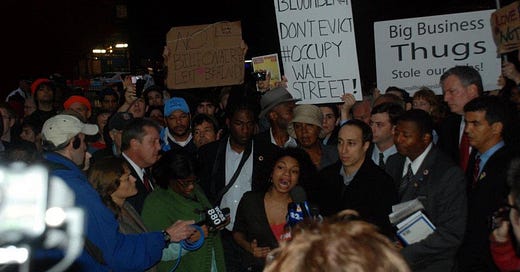Occupy Wall Street at 10
Why it matters still, and the positive (and negative) lessons it taught organizers.
As promised earlier this week, here’s my new piece in The New Republic on why it mattered, and also a stab at what it meant to people who participated in it.
I’m happy with how the piece turned out, though I realized in the middle of the night last night that I forgot to mention the Strike Debt offshoot of Occupy, which focused on debt resistance and organizing relief and power for people saddled with huge college loans. Strike Debt’s Rolling Jubilee project bought millions of dollars of outstanding student debts on pennies to the dollar, giving thousands of people direct relief. That effort led to the Debt Collective, which has organized debtors to put pressure on Washington to make sweeping changes in student debt (and whose slogan, “You are not a loan” remains one of my favorite Occupy neologisms). The Debt Collective has succeeded in liberating debtors of nearly $3 billion so far; their diligent organizing has also been embraced by many progressive political leaders all the way up to Bernie Sanders and Elizabeth Warren. Ryann Liebenthal had a spectacularly good piece on this whole history in The New Republic this past spring; their forthcoming book on the student debt crisis should be a must-read.
For all its impressive victories, the movement to cancel student debt is also an interesting example of a cause without benefactors. For example, the Ford Foundation, which has made Fighting Inequality its central organizing principle, has never given the Debt Collective sustained support. The stated reason? Debt Collective doesn’t fit in any of its program areas. Just this year, I’m told, a hardworking program officer in Ford’s cities program managed to grant it $50,000. And without sustained support, the organizers "at the heart of this work are getting worn down. Ideally, they need a committed $250,000 a year for three years to keep going. (If you want to fund their work, hit reply and I’ll connect you with their team.)
Speaking of organizers, others who played important roles in Occupy Wall Street are sharing their own reflections this week. Make sure to read this thread from Nelini Stamp, who was a young Black staffer with NY’s Working Families Party in 2011, who went to Zuccotti on the first day and was blown away by its first General Assembly. “Hearing all the stories I knew I wasn’t alone,” she recalls. And the fact that she and others could take ownership of the movement “without going through a gajillion hoops” blew her away.
If you doubt Occupy’s influence, take a look at this photo from Stamp’s thread, which was when politicians like Leticia James, Bill de Blasio, and Jumaane Williams all showed up to defend the encampment from the NYPD.


Make sure your sound is turned on for this:

On Facebook, Charles Lenchner, a longtime organizer who was one of the co-founders of People for Bernie, shares his story of joining Occupy Wall Street on day one and then struggling to convince his fellow occupiers that the effort needed an email list. He recounts how the Tech Ops working group took a while to come around to supporting the idea, but then foundered over the group’s commitment to only use open source tools. Lenchner, who is known for his drole sense of humor, points out that Occupy used commercial software from beginning to end, including Gmail, Google groups, Paypal, and Photoshop, but apparently that escaped scrutiny. He also recalls strong opposition to an email list coming from one of the earliest and most committed anarchists in the movement, Marisa Holmes, who didn’t want the group to help people interested in Occupy connect to each other. ‘They should find each other, it's their own responsibility, not ours,’ he paraphrases her saying. This despite the fact that thousands of people had filled out paper contact sheets and willingly wanted to keep in touch. “This to me was peak Occupy at its worst,” Lenchner writes, “where the virtue signal of 'we're Horizontalists' was deliberately and with full knowledge making sure that we didn't build power.”
As I write in my New Republic piece, the negative lessons of Occupy are as important as the positive ones, and they are absolutely operative in the work that organizers are doing today.
Bonus link: Astra Taylor and Jonathan Smucker in New York magazine, on how Occupy changed everything.



